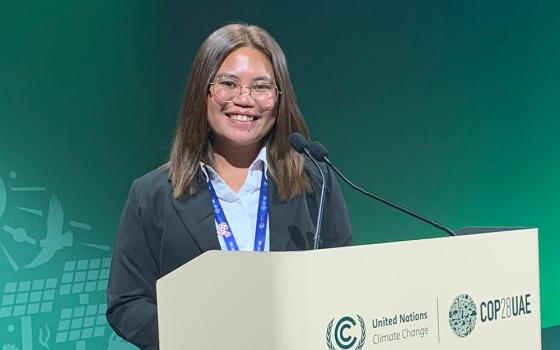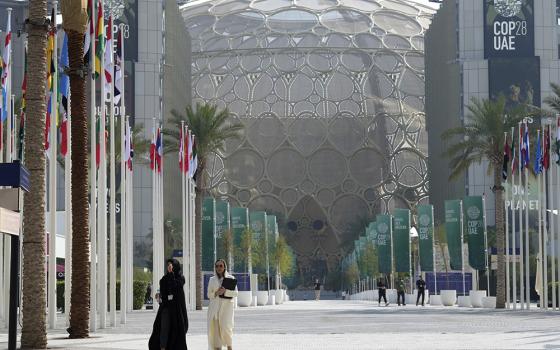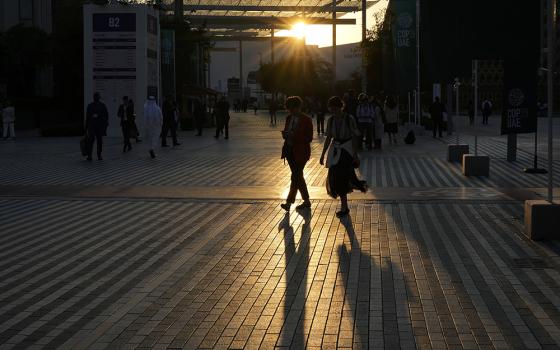Fatima Abdi, 50, a Somali woman, sits inside her flooded makeshift shelter following heavy rains at the Al Hidaya camp for the internally displaced people on the outskirts of Mogadishu, Somalia, Nov. 6, 2023. Ahead of the COP28 U.N. climate change conference Nov. 30-Dec. 12, Catholic leaders in Africa called for decisive action against climate change, as churches and agencies moved to aid people affected by floods. (OSV News/Reuters/Feisal Omar)
Ahead of COP28, the U.N. climate change conference, Catholic leaders in Africa called for decisive action against climate change, as churches and agencies moved to aid people affected by floods.
The flooding — linked to the El Niño phenomenon caused by warming of the ocean surface — has killed dozens of people and displaced thousands in eastern Africa. The impact is being felt more in semi-arid and arid regions. Months ago, these zones were the scenes of a severe drought, which the United Nations described as the worst in 40 years.
"Things are not good. Many areas are now flooded and families are trying to move to higher grounds. The roads have either been swept away or were impassable," Fr. Fredrick Wafula, a priest in the Diocese of Garissa, in Kenya's northeastern region, told OSV News.
The priest, who oversees the diocesan Caritas agency, said that the people in the region are never settled in the recurring weather events, and that the church is always trying to mitigate its consequences.
"We have been going through this for a long time. We have two calamities. If it's not a drought, it's flooding. Of course, we are attributing these to climate change," said Wafula.
"Whenever we are out of drought, we are excited about the rains, and when it finally comes, again it's a different story — flooding," he said.
Advertisement
During the disasters, according to Wafula, the church has been providing relief items such as food and other basic necessities. But as a drought emergency food aid requested earlier has just arrived, the diocese now has to change distribution plans because of the flooding.
"We need to think more and more about how we are going to find a long-term solution," the priest said.
On Nov. 7, the Kenya Red Cross said 26,000 households in the northeastern region had been affected by the torrents, with homes being submerged, and crops and livestock swept away. Only months ago on these grounds, excessive heat related to the drought had scorched young crops on farms, snuffed out livestock pastures and dried up water sources.
Similar floods are occurring in Ethiopia, Somalia, Burundi and Malawi. The U.N. Office for the Coordination of Humanitarian Affairs said Nov. 6 the floods had affected more than 700,000 people in Somalia, with at least 100,000 displaced from their homes.
In September, the Mediterranean's deadly Cyclone Daniel killed at least 4,000 people in Libya and left over 10,000 missing. In February and March this year, Cyclone Freddy struck South Africa, triggering massive floods in Malawi, Mozambique and Madagascar, killing at least 1,200. Nearly 1,300 were injured and over 500 reportedly missing. The cyclone destroyed farmlands and homes and stretched hospitals to capacity.
A climate activist holds a placard as demonstrators in South Africa gather outside the Cape Town International Convention Center Sept. 13, 2023, during the Southern Africa Oil and Gas Conference to call for climate justice resistance against oil and gas corporations and an end to fossil fuels. (OSV News/Reuters/Esa Alexander)
Ashley Kitisya, fossil free campaigner for Africa, said the unpredictable shifts between heavy rains and severe droughts demanded an immediate action to address the deepening climate crisis.
"Critical steps involve bolstering water resource management, promoting sustainable agriculture, and fortifying resilient infrastructure to safeguard food security and livelihoods," Kitisya told OSV News, adding the urgency escalated the need to phase out fossil fuels and switch to low-emission clean energy.
But as Africa bears the brunt of the global climate crisis, Catholic bishops in the continent have called on world leaders who will attend the Nov. 30-Dec. 12 COP28 in Dubai in the United Arab Emirates to take ambitious action to protect "our common home and the most vulnerable."
In an Oct. 12 statement, the African bishops — under the Symposium of Episcopal Conferences in Africa and Madagascar, or SECAM — called for the phasing out of fossil fuels, the activation of a loss and damage fund, reduction of greenhouse gas emissions and the tackling of climate change and biodiversity loss.
Nikki Gamer, senior public affairs manager at Catholic Relief Services, said the U.S. bishops' overseas development and relief agency was watching the debate on a loss and damage fund, which is viewed as urgent to provide compensation to communities suffering losses due to the climate change crisis.
The fund was set up to help less economically developed countries mitigate the effects of climate change. But there has been some debate about who should contribute most to it.
Climate activists in South Africa hold placards as they gather outside the Cape Town International Convention Center Sept. 13, 2023, during the Southern Africa Oil and Gas Conference to call for climate justice resistance against oil and gas corporations and an end to fossil fuels. (OSV News/Reuters/Esa Alexander)
"We are advocating for an independent fund that is fully accountable and guided by the COP and the Paris Agreement and for a fund that provides grants with human rights principles and stakeholder inclusion at the core. In addition, we believe that developed countries should lead in terms of contributions to this fund," Gamer told OSV News.
The Paris Agreement is a legally binding international treaty on climate change adopted by 196 Parties at the U.N.'s COP21 in Paris in 2015.
At the same time, the African bishops are concerned that foreign debt repayment — standing at $62 billion this year — is frustrating efforts to boost climate resilience.
"(In) the aftermath of the COVID-19 pandemic, most African countries are still struggling to regain their 2019 economic performance levels, and unfortunately … there are nearly 600 million people living in poverty and approximately 280 million who are experiencing hunger," said Bishop Stephen Mamza Dami of Yola, Nigeria, SECAM's vice president, in an Oct. 11 statement.
Jesuit Fr. Charles Chilufya, director of the Justice and Ecology Office at the Jesuit Conference of Africa and Madagascar, said the continent's plea was a collaboration to make financial and debt justice the cornerstones for climate justice.
"As we look towards COP28, let this be more than a rallying cry … a catalyst for transformative action," the priest told OSV News.






